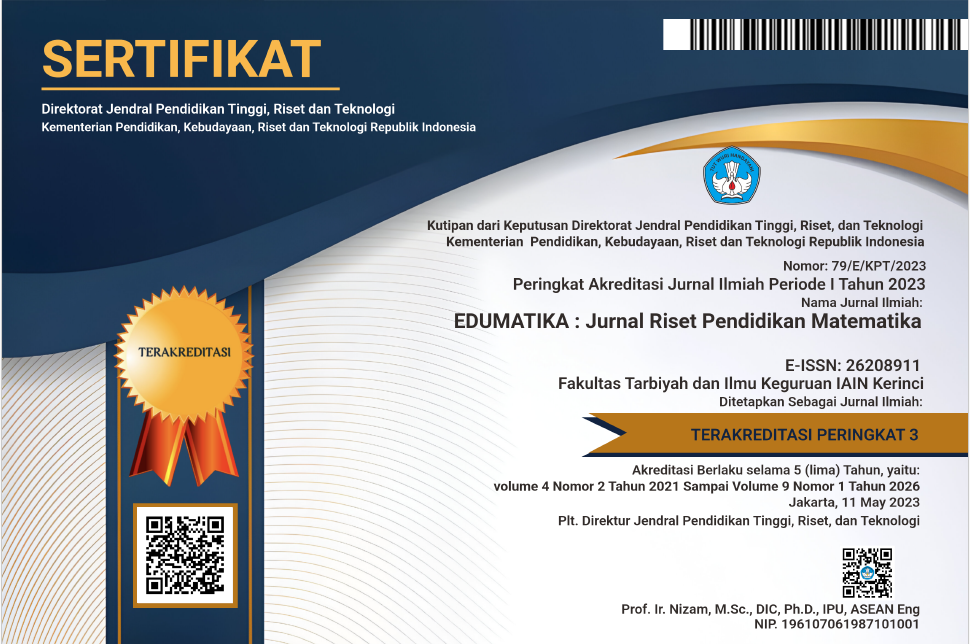The Mathematical Reasoning of the Quran Reciting Student by the Quran Recitation Ability
Abstract
Reciting the Quran is a good habit that can improve people's cognitive abilities, including reasoning. However, according to Bloom's theory, memorization is categorized as the lowest cognitive domain, while according to NCTM, the reasoning is included in the higher-order thinking process. Hence, there is a contradiction in theories of thinking. This study aims to describe the type of reasoning of reciting the Quran students based on their recitation of the Quran ability. This research method is qualitative with a case study approach. The instrument used in this study was a reasoning test and interview guidelines. The results showed that 3 of 4 subjects with high recitation ability used creative reasoning, only one with medium recitation ability used algorithmic reasoning, and none with low recitation ability used a specific reasoning type.
Downloads
References
Abdullah, I. H. (2016). Berpikir kritis matematik. Delta-Pi: Jurnal Matematika dan Pendidikan Matematika, 2(1).
Al Hafiz, M. M., Yusof, M. F., Ghazali, M. A., & Md. Sawari, S. S. (2016). Descriptive Qualitative Teaching Method of Memorization in The Institution of Tahfiz Al-Quran Wal Qiraat Pulai Condong and the Students’ Level of Academic Excellence. Mediterranean Journal of Social Sciences, 7(1), 79–85. https://doi.org/10.5901/MJSS.2016.V7N1S1P79
Baddeley, A. D. (1988). Citation Classic : The Psychology of Memory. Harper and Row. http://eprints.whiterose.ac.uk/66406/
Bergqvist, T., & Lithner, J. (2012). Mathematical Reasoning in Teachers’ Presentations. The Journal of Mathematical Behavior, 31(2), 252–269. https://doi.org/10.1016/j.jmathb.2011.12.002
Bunge, S. A., & Leib, E. R. (2020). How Does Education Hone Reasoning Ability? Current Directions in Psychological Science, 29(2), 167–173. https://doi.org/10.1177/0963721419898818
Cresswell, C., & Speelman, C. P. (2020). Does mathematics training lead to better logical thinking and reasoning? A cross-sectional assessment from students to professors. PloS one, 15(7), e0236153.
Faiziyah, N. (2018). Memorizing Qur’an and Mathematics Achievement. MEJ (Mathematics Education Journal), 2(1), 7–11. https://doi.org/10.22219/MEJ.V2I1.5800
Firdausi, F. (2017). Optimasi Kecerdasan majemuK sebagai metOde menghafal al-Qur’an (studi atas buku “metode ilham: menghafal al-Qur’an serasa bermain game” karya lukman hakim dan ali Khosim). Jurnal Studi Ilmu-ilmu Al-Qur'an dan Hadis, 18(2), 189-210.
Gade, F. (2014). Implementasi Metode Takrar dalam Pembelajaran Menghafal Al-Qur'an. Jurnal Ilmiah Didaktika: Media Ilmiah Pendidikan dan Pengajaran, 14(2).
Gunarta, R. (2019). Perbandingan Memori Jangka Pendek pada Santri Penghafal Al-Qur'an dan Bukan Penghafal Al-Qur'an. Univesity Muhammadiyah Malang.
Gunawan, I., & Palupi, A. R. (2016). Taksonomi Bloom–revisi ranah kognitif: kerangka landasan untuk pembelajaran, pengajaran, dan penilaian. Premiere educandum: jurnal pendidikan dasar dan pembelajaran, 2(02).
Jazuli, A. (2013). Description of Mathematical Creative Thinking and Reasoning Ability of SMP Students in Islamic Culture-Based Learning. Educare, 6(1), 81–90. https://www.journals.mindamas.com/index.php/educare/article/viewFile/288/287
Lithner, J. (2008). A Research Framework for Creative and Imitative Reasoning. Educational Studies in Mathematics, 67(3), 255–276. https://doi.org/10.1007/s10649-007-9104-2
Manasikana, M. ., & Junaedi, I. (2021). Kemampuan Berpikir Kritis ditinjau dari Kemampuan Aktivitas Menghafal Al-Quran dengan Pembelajaran SSCS (Search, Solve, Create, and Share). UJMES, 06(02), 038–045.
Morsanyi, K., McCormack, T., & O'Mahony, E. (2018). The link between deductive reasoning and mathematics. Thinking & Reasoning, 24(2), 234-257.
Munawaroh, I., & Haryanto. (2005). Neuroscience dalam Pembelajaran. In Majalah Ilmiah Pembelajaran (Vol. 1, Issue 1, pp. 117–125).
Nawaz, N., & Jahangir, S. F. (2015). Effects of Memorizing Quran by Heart (Hifz) on Later Academic Achievement. Journal of Islamic Studies and Culture, 3(1), 58–64. https://doi.org/10.15640/jisc.v3n1a8
Putra, A., Tensa, Y., & Erita, S. (2020). Analisis Penalaran Proporsional Siswa dengan Gaya Belajar Auditori dalam Menyelesaikan Soal Perbandingan. Journal on Education, 2(4), 323-330.
Romi, R., Arief, Y., & Siregar, J. (2018). Perbedaan Prestasi Belajar Matematika antara Siswa yang Mengikuti dan Tidak Mengikuti Program Menghafal Al-Quran. An-Nafs, 12(1), 1–11. https://journal.uir.ac.id/index.php/annafs/article/view/2018
Rosdiana, I. ., & Ikrimah. (2020). Effects of Memorizing Al-Qur’an on Mathematical Reasoning. Daya Matematis : Jurnal Inovasi Pendidikan Matematika, 8(2), 113–118.
Rosnawati, R. (2013). Kemampuan penalaran matematika siswa SMP Indonesia pada TIMSS 2011. In Prosiding Seminar Nasional Penelitian, Pendidikan dan Penerapan MIPA, Fakultas MIPA, Universitas Negeri Yogyakarta (Vol. 18, pp. 1-6).
Rustam, I. (2021). Analisis Penalaran Matematika Berdasarkan Gender ditinjau dari Kemampuan Hafalan Al Quran. Delta-Pi: Jurnal Matematika Dan Pendidikan Matematika, 10(1), 122–137. https://doi.org/10.33387/dpi.v10i1.2976
Sajiman, S. U., & Hasbullah. (2021). Improving students’ mathematical reasoning ability through apperception learning to read the Qur’an and self efficacy. AIP Conference Proceedings, 2331(1), 1–6. https://doi.org/10.1063/5.0041669
Sayuri, M., Yuhana, Y., & Syamsuri, S. (2020). Analisis Kemampuan Penalaran Matematis Siswa SMP Ditinjau dari Gaya Belajar. Wilangan: Jurnal Inovasi dan Riset Pendidikan Matematika, 1(4), 403-414.
Slamet, S. (2019). The Effect of Memorizing Quran on The Children Cognitive Intelligence. Humanities & Social Sciences Reviews, 7(3), 571–575. https://doi.org/10.18510/hssr.2019.7384
Sugilar, H., Dedih, U., Anwar, C., Priatna, T., Lestari, A., & Darmalaksana, W. (2020). The Correlation between Logic Ability, Mathematical Proof and the Holy Qur’an Recitations. Journal of Physics: Conference Series, 1467(1), 1–7. https://doi.org/10.1088/1742-6596/1467/1/012024
Sukirwan, S., & Muhtadi, D. (2022). Studi Literatur Reviu: Dinamika Penalaran dan Argumentasi Dalam Pembelajaran Matematika. Journal of Authentic Research on Mathematics Education (JARME), 4(2), 234-247.
Copyright (c) 2022 Azkiya Salsabila, Farida Nurhasanah, Arum Nur Wulandari

This work is licensed under a Creative Commons Attribution 4.0 International License.















